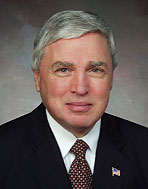
Progress and Opportunity
 Last week, President Bush nominated me to be the commissioner of the Food and Drug Administration (FDA). I have enjoyed serving as interim FDA commissioner, a post I have held since last September, and am honored by the President's decision to nominate me for this important public health leadership position.
Last week, President Bush nominated me to be the commissioner of the Food and Drug Administration (FDA). I have enjoyed serving as interim FDA commissioner, a post I have held since last September, and am honored by the President's decision to nominate me for this important public health leadership position.
I look forward to sharing with members of Congress and the medical community my aspirations for this critical agency, and how I believe we can take advantage of the numerous opportunities afforded by advances in science and technology to protect and improve our nation's health.
As a result of this nomination, I intend to resign as NCI director. I have enjoyed my time at NCI more than I could have possibly imagined. The opportunity to fly at 40,000 feet, so to speak, and witness the remarkable breadth of work done at NCI and in the entire cancer community, but, more importantly, the unmatched dedication to saving lives, has been truly gratifying.
Dr. John Niederhuber, NCI deputy director for clinical and translational sciences, has been serving as NCI chief operating officer since late September, and will continue in this role until an acting director for NCI is named. John has done an outstanding job of overseeing the day-to-day operations at NCI over the past 6 months. I am supremely confident that he, along with the other members of NCI senior leadership, will ensure that NCI continues to play the important leadership role in guiding the country's cancer research enterprise.
I came to NCI just over 4 years ago. Not long afterward, the institute announced an important goal: to eliminate the suffering and death due to cancer by 2015. The concept behind this goal - one strongly supported by the exploding portfolio of solutions emanating from cancer research - is that we will increasingly be able to preempt the cancer process: preempt it with improvements in prevention, early detection, elimination, or modulating the diseases' virulence.
It was a bold goal then, and it is a bold goal now. But "bold" is not synonymous with "unlikely" or "impossible." On the contrary, it's a goal that I, and now many others in the cancer community, believe is within our grasp.
My confidence in our ability to achieve the 2015 goal goes beyond the remarkable advances in science and technology seen over the past decade. My confidence is rooted in an absolute trust that the cancer community would take up this challenge with vigor and optimism, that it would view no barrier as insurmountable, no challenge as too great.
As the recent release of the NCI strategic plan demonstrates, we now have before us a world-changing opportunity. Every day we are identifying susceptibility points in the cancer development process, and we are simultaneously studying and developing new interventions that can exploit those susceptibilities. That work is being aided by advances in areas like nanotechnology, imaging, proteomics, and information technology. But without the unprecedented intellectual capacity of the cancer research community and the unrelenting commitment of our advocacy community, these technologies would mean nothing. In the end, it's all about the people who are making this progress a reality.
We established a bold goal 4 years ago. But we are defined not by goals, but by accomplishments. And I have no doubt that we can accomplish a great many things as a community committed to a vision of a world where there no longer is suffering and death due to cancer.
Dr. Andrew C. von Eschenbach
Director, National Cancer Institute
|